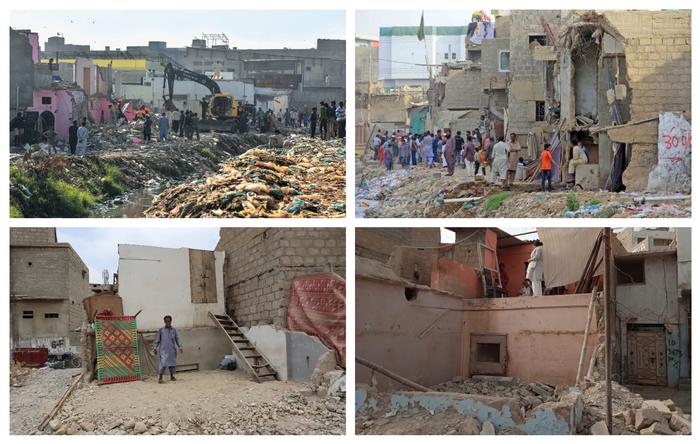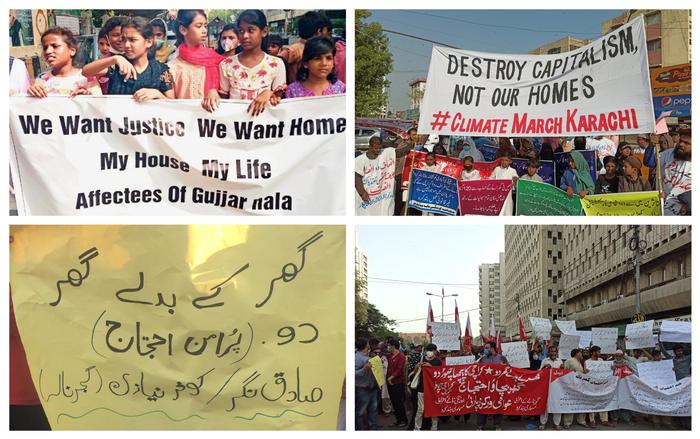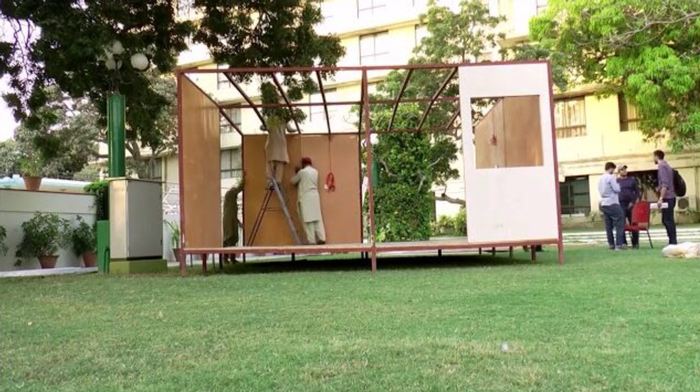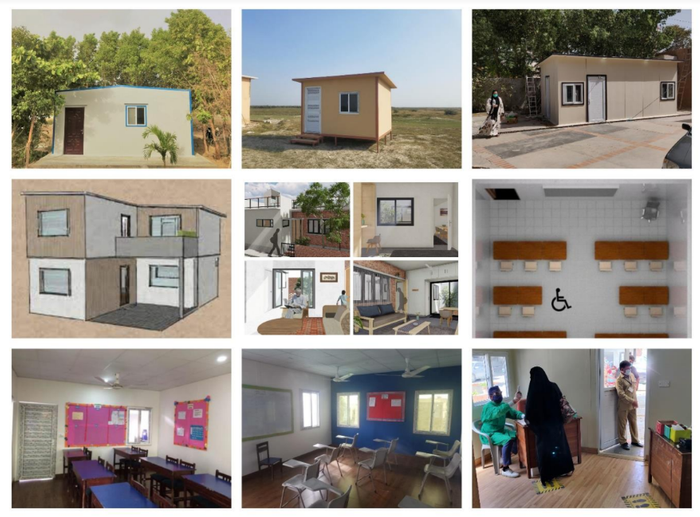Hadiya and Swaleha Javed - ProposalAbode for the Vulnerable - Proposal to Volunteer with ModulusTech.In the year 2020, a devastating spell of rains flooded Karachi, prompting the government to begin cleaning the city's Nullahs (n. dried water courses in the native Urdu language), that drain rainwater into the sea. The routes of these waterways must be cleansed because they are blocked, silted up, and hemmed in by the dwellings from both sides. Gigantic bulldozers proceeded towards the gullies of Gujjar and Orangi as soon as the authorities issued the notice to carpet a new road along the Nullahs to avoid future encroachments. Without prior notification or a relocation plan, the authorities just decided one day to demolish the abodes of the poor. As a result, these vulnerable people were forced to stay without shelter in blistering heat, unpredictable weather, surrounded by foul odors from the sewage water, on the rubble of their homes, which they built with their blood and sweat over many years. According to Abraham H. Maslow’s hierarchy of human needs, ‘shelter’ is among the most basic human survival needs, alongside nourishment, rest, clothing, overall health, and reproduction. These basic physiological needs must be addressed before humans can move on to the next level of fulfillment to achieve their full potential – ‘self-actualization’. Due to several unfortunate events, such as natural disasters caused by climate-change, war, terrorism, and urban-displacements, today’s underdeveloped and developing countries, including Pakistan, are facing a massive housing crisis. According to research, between 25% - 33% of urban people in developing countries are living in poverty and unable to afford adequate housing. Slum is the most common dwelling typology in many of the world's rapidly-developing urban areas. Slum-dwellers do not have adequate living conditions to lead a quality life. In addition to poverty and hardship, they confront a variety of social and physical problems. Their homes are typically defined as dangerous, unhygienic, and overcrowded, with limited or no access to basic utilities like water, electricity, and transportation. Their homes are largely unstable, with weak structures that are easily blown away or destroyed during storms, earthquakes, and land-tenure issues. Lack of climate-resilience makes their homes unfit for survival during extreme weather events like heatwaves and heavy rains. Furthermore, they are prone to forced-evictions and move to the outskirts of cities, to unplanned and poorly served areas, often ending up with poorly constructed shelters in locations that are dangerous and highly susceptible to disasters and other sorts of environmental problems as they try to meet their immediate shelter needs. Given the constant threat of eviction, many people living in poor urban settings are deterred from investing their limited financial resources into upgrading or adapting their houses to be more energy-efficient and climate-resilient. In my essay for this year’s Berkeley Prize, which was set in the metropolis of Karachi, I discussed how the harrowing mass-evictions that occurred lately along the Gujjar and Orangi Nullahs rendered more than half a million people homeless. This, combined with a slew of other catastrophic events that took place in the name of "urban development" in Karachi, where nearly half of the city's population lives in slums or shanty towns, has resulted in a huge number of displaced people and a housing shortage of over ten million units, all in the wake of the global pandemic, economic, and climate-change crisis. Compounded by poor urban planning, these evictions occurred largely because of the climate-change. The ongoing menace of global-warming has reduced the credibility of their self-built dwellings, causing havoc on people's livelihoods and communities, and consequently increasing mortality rates. Climate change has a negative impact on people's psycho-social wellbeing, especially when they are displaced from their homes. Following the evictions of the Gujjar and Orangi, the public outcry and rallies chanted slogans like "Ghar-ke-badle-ghar-do" which translates to "give us a house in return for the (demolished) house". In this perilous situation, the 'social art of architecture' can play a critical role in helping marginalized communities in meeting their immediate housing needs and enhancing their quality of life. Providing disadvantaged families with 'quick, affordable, and sustainable housing,' for example, may have a significant impact on their general well-being and also serve as a source of socio-economic fruition for future generations. In 2016, ModulusTech, a for-profit social enterprise came into existence in Karachi by a team of socially responsible civil-engineers with the goal of revolutionizing the affordable housing sector to overcome the prevailing housing crises, both locally and globally. Established as a hardware startup, the team is the first to device a sustainable yet affordable flat-packed housing solution in Pakistan, designed to provide adequate living conditions to the potential users – the bottom 40% in urban cities like Karachi, a population currently living in slums and remote areas, that often lack access to electricity and clean drinking water. The houses that they build are easy to construct, relocatable, and environmentally sustainable. With 90% lower carbon-footprint, these energy-efficient prefabricated home modules combine passive design with renewable energy and water systems to achieve Net-Zero-Energy, besides incorporating 'Do-It-Yourself methodology,' which helps to reduce waste and carbon emissions while operating off-grid. Built in a matter of days, it allows easy and quick construction that is both time and labor-efficient. They collaborate with and reach out to local communities, governments, and other organizations such as NGOs, developers, contractors, and corporates and/or private enterprises in order to put this idea into action for the potential beneficiaries. The homes are mortgaged to the end users, who are only required to pay a small payment, similar to what they would pay as rent in a slum. 'Affordability, sustainability, inclusion, and adaptability' are all the hallmarks of their creation. A single housing unit may endure as long as a normal brick and cement house, with a longevity of more than 50 years. Each unit costs as little as 3000 USD, making it accessible the low-income user-groups. Other applications for which the technology may be adapted and used include, but are not limited to, schools, clinics, disaster-response, labor-housing, and public-housing colonies. The startup supports at least ten UN Sustainable-Development-Goals and their work has received national and international recognition, including from the Islamic Development Bank and the United Nations. Moreover, it made to the Forbes' 30 Under 30 list for its social impact. I would like to take advantage of this opportunity to volunteer for ModulusTech under the supervision of Mr. Nabeel Siddiqui, who is currently focused on innovating the product's design and reaching out to the potential user groups it was originally meant to serve. In the words of one of the co-founders, “Most people in Pakistan have this perception that a brick-and-mortar house must take time to build and it has to be expensive to put together otherwise it will not be long-lasting. Convincing them that it is just as sustainable and tough as any house is still a struggle”. I have contacted Mr. Nabeel S. and obtained confirmation from him as well. SCHEDULE AND RESPONSIBITIES I, along with my team-mate, will be assisting ModulusTech in one of their ongoing social-housing projects in Karachi and will be engaged in the design and construction of their small community projects across the city. I will also be conducting awareness seminars and interacting with local communities, participate in meetings, and contribute to presentations and reports in order to gain a thorough understanding of how the organization operates and collaborates with key stakeholders. I hope to use this opportunity to help the company achieve its vision, that is to maximize the usability of their products in the impoverished areas, by participating in the design development process and incorporating "social factors research" in design to expand the product's efficacy in Karachi's vulnerable urban areas. The overall length of the time for my volunteering activities will be eight weeks, preferably five to six days per week. The detailed schedule will be provided by Mr. Nabeel S. in a few weeks' time. I'm certain that this will be an excellent opportunity to learn more about Karachi's vulnerable communities, such as slum dwellers and internally displaced people. In response to the present housing crisis, I can increase awareness in my local community about sustainable housing. It will also allow me to connect with some of the most important stakeholders in the design process: producers and end-users. Working with such a cluster would enlighten me about the many stages involved in the construction of the housing products, from conception to completion and use, including the production, development, and synchronization of multiple entities during the construction process. Likewise, applying social factors research to the built environment will undoubtedly contribute to a deeper understanding of the issues that people living in vulnerable urban environments face, as well as the role of architectural technologies in positively impacting communities. This will be an asset for my future architectural education, as I plan to pursue higher education in sustainable architecture. I sincerely hope I am awarded this fellowship. REFERENCES: The company website: https://www.modulus-tech.com/ CONTACT PERSON: Mr. Nabeel Siddiqui (CEO & Co-Founder, Modulus Tech) Email address: nabeel@modulus-tech.com OTHER REFERENCES/LINKS: https://reall.net/wp-content/uploads/2020/09/ModulusTech.pdf https://reall.net/blog/spotlight-on-modulustech/ https://challenge.whatdesigncando.com/projects/modulustech-flat-packed-housing-made-sustainable-and-affordable/ https://profit.pakistantoday.com.pk/2019/07/15/need-5-million-homes-in-five-years-these-three-entrepreneurs-might-have-answers/ https://vimeo.com/586683861?embedded=true&source=vimeo_logo&owner=51501005 https://www.youtube.com/watch?v=htB2wrWYOAc https://youtu.be/vikr-QmDPAA?t=1 https://www.forbes.com/30-under-30/2021/asia/social-impact?profile=modulustech Additional Help and InformationAre you in need of assistance? Please email info@berkeleyprize.org. |




